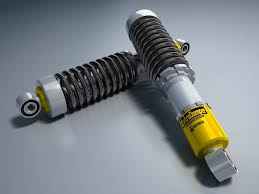Difference between revisions of "Mechanical springs and spring-dampers"
(Created page with "thumb * '''Natural Frequency range:''' 3 -9 Hz * '''Pros:''' ** Easily available and can be designed with required specifications (stiffness, strengt...") |
|||
| (2 intermediate revisions by the same user not shown) | |||
| Line 1: | Line 1: | ||
| − | [[File: | + | [[File:SD1.png|thumb|An example of a mechanical spring. Image reproduced from [http://maxpixel.freegreatpicture.com/Damper-Graphic-Design-Wallpaper-Spring-Yellow-2118130 here]]] |
* '''Natural Frequency range:''' 3 -9 Hz | * '''Natural Frequency range:''' 3 -9 Hz | ||
* '''Pros:''' | * '''Pros:''' | ||
| Line 6: | Line 6: | ||
* '''Cons:''' | * '''Cons:''' | ||
* Spring have very low internal damping 0.5% | * Spring have very low internal damping 0.5% | ||
| + | ---- | ||
| + | If you are done reading this page, you can go back to [[Transportation#Types of PVI Systems| Types of PVI Systems]] | ||
Latest revision as of 11:01, 23 February 2018

An example of a mechanical spring. Image reproduced from here
- Natural Frequency range: 3 -9 Hz
- Pros:
- Easily available and can be designed with required specifications (stiffness, strength)
- Low Cost
- Cons:
- Spring have very low internal damping 0.5%
If you are done reading this page, you can go back to Types of PVI Systems